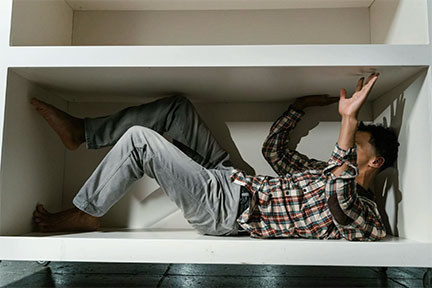
Claustrophobia, the fear of confined spaces, affects many individuals. Whether in a crowded elevator, a small room, or even a packed subway train, the feeling of being trapped can be overwhelming.
One potential treatment gaining attention is claustrophobia with hypnotherapy, which has shown promise in helping individuals manage and overcome their fear.
But how effective is hypnotherapy in alleviating the symptoms of claustrophobia? We’ll explore how hypnotherapy works, its effectiveness for claustrophobia, and the potential benefits of using this treatment option.
Understanding Claustrophobia and Its Impact 
Claustrophobia falls under the category of specific phobias, which are marked by a disproportionate fear of particular environments or scenarios. In the case of claustrophobia, the fear is centered around enclosed or confined spaces.
This can range from fear of tight places, such as elevators or tunnels, to the distress caused by crowded rooms or airplanes. For some individuals, the fear can lead to significant disruptions in their daily lives, limiting their ability to travel, work, or even socialize.
Common symptoms of claustrophobia include dizziness, rapid heartbeat, shortness of breath, sweating, and panic attacks. When the condition is more severe, individuals may adopt avoidance behaviors, consciously avoiding scenarios that could trigger their symptoms.
What Is It and How Does Hypnotherapy Work?
Hypnotherapy is a therapeutic method that employs relaxation, focused attention, and suggestion to induce a heightened state of awareness, commonly known as a trance. In this trance-like state, the subconscious mind becomes more receptive to suggestions, enabling the therapist to work on issues such as emotional blockages, phobias, and anxiety.
The primary goal of hypnotherapy for phobias, including claustrophobia, is to identify the root causes of the fear and work to reframe the individual’s response to confined spaces. It can help change negative thought patterns and associations related to these situations, making them less distressing. Hypnotherapy often focuses on relaxation techniques, imagery, and suggestions to reprogram the mind and reduce the intensity of the fear response.
Can Hypnotherapy Help Alleviate Claustrophobia?
Claustrophobia can be effectively managed with the help of hypnotherapy. By addressing both the subconscious and conscious aspects of the fear, hypnotherapy aims to reduce the intensity of the phobic response. This treatment works by helping individuals alter their perception of confined spaces, allowing them to feel more in control and less anxious.
Several factors contribute to the effectiveness of hypnotherapy in treating claustrophobia:
- Subconscious Reprogramming: Hypnotherapy works by tapping into the subconscious mind, where deep-seated fears and anxieties are often stored. By altering these subconscious beliefs, hypnotherapy can help reframe the individual’s fear of confined spaces and reduce their emotional and physical response.
- Relaxation Techniques: During a hypnotherapy session, relaxation techniques help individuals remain calm and centered. This relaxation can be especially beneficial for claustrophobics, as it can provide them with the tools to manage their anxiety when faced with tight spaces.
- Visualization and Positive Suggestions: Hypnotherapists often use visualization to help individuals imagine themselves in confined spaces without fear. These visualizations help to desensitize the person to their triggers, allowing them to associate enclosed spaces with safety and calmness instead of fear and panic.
- Gradual Exposure: Hypnotherapy may also involve gradual exposure to confined spaces in a controlled and safe environment. This exposure helps individuals build resilience and desensitize themselves to situations that provoke fear. Over time, they can reprogram their responses and learn to tolerate the sensation of being in an enclosed space.
The Benefits of Hypnotherapy for Claustrophobia
While hypnotherapy is not a one-size-fits-all solution, many individuals report significant improvements after undergoing treatment. Some of the key benefits include:
- Reduction in Anxiety: Hypnotherapy helps individuals reframe their fear of confined spaces, reducing the overall anxiety and panic attacks associated with claustrophobia.
- Improved Coping Mechanisms: Hypnotherapy provides individuals with coping mechanisms to handle situations that previously caused distress. With the help of relaxation and visualization techniques, individuals can manage their anxiety more effectively.
- Long-Term Results: Many individuals who undergo hypnotherapy for claustrophobia report long-term benefits. Unlike some other treatments, hypnotherapy works to address the root cause of the phobia, helping to create lasting change in how individuals perceive and react to enclosed spaces.
- Non-Invasive Treatment: Hypnotherapy is a non-invasive treatment option that does not rely on medications or other physical interventions. This makes it appealing to those who prefer natural and holistic approaches to overcoming their fears.
- Personalized Approach: Hypnotherapy’s primary advantage lies in its capacity to be personalized to address the individual’s unique requirements. A hypnotherapist can address personal triggers and fears, ensuring that the treatment is highly personalized.
Is Hypnotherapy the Right Choice for You?
Hypnotherapy offers a highly effective approach to treating claustrophobia. It enables individuals to face their fear of confined areas and regain control over their lives. By engaging with the subconscious, hypnotherapy can reframe harmful beliefs, lower anxiety, and supply individuals with practical techniques for managing their fear. However, as with any therapeutic option, it is important to consult with a professional to determine if hypnotherapy is the right fit for your needs.
Disclaimer:
The information in this article is for educational and informational purposes only and is not intended as a substitute for professional medical advice, diagnosis, or treatment. Hypnotherapy results can vary, and it may not be suitable for everyone. Always seek the advice of a licensed healthcare provider or mental health professional regarding any medical or psychological condition, including claustrophobia. Never disregard professional advice or delay in seeking it because of something you have read here.
